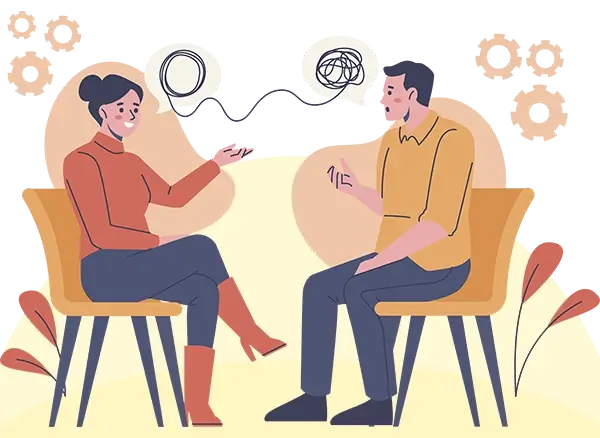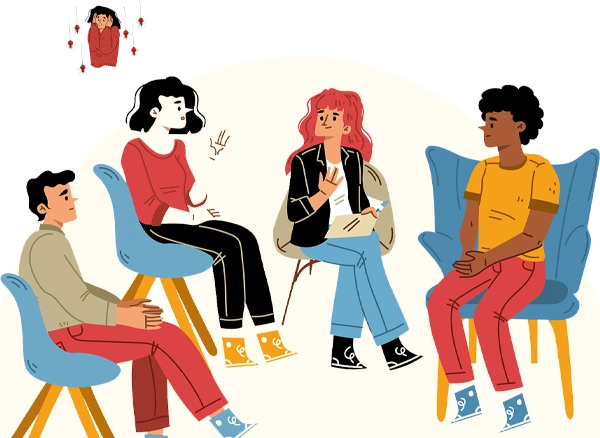Learn whether you may be living with ADHD with this expert-reviewed test. After receiving your results, you’ll have the opportunity to learn more about your symptoms and talk to a licensed therapist.
This mental health assessment is not a diagnosis or a substitute for licensed therapy. For more information on how to get scheduled with a qualified mental health professional, read our guide here.
Have you ever felt as though you have difficulty focusing or tend to be forgetful? Those are possible symptoms of Attention Deficit Hyperactivity Disorder. This fast and free online assessment is meant to provide insight into ADHD symptoms and help you understand if you have experienced them. This test is not a substitute for an official diagnosis or mental health support from a qualified individual. There are a variety of ADHD symptoms, so this test is just meant to help you understand if there is any possibility that you might have ADHD by highlighting some of the possible symptoms.
Begin Test
One major symptom of ADHD is having trouble focusing and being forgetful, although this is not all ADHD is. An individual with ADHD may also have trouble following instructions. They may feel restless and have a hard time sitting still. This may lead to an individual losing motivation for tasks and struggling to complete or start tasks, even if they know it is important.
ADHD has a variety of possible causes. The mental health condition tends to be a developmental disorder that presents itself in childhood. It may be caused by anatomical and genetic factors. The brain’s structures and one’s genes can contribute to the development of ADHD symptoms. There have also been studies that have shown that ADHD can also present itself with brain injuries.
There are a variety of therapies that are used in ADHD treatments. Cognitive Behavioral Therapy is used to help individuals with ADHD symptoms reframe their thoughts and develop coping strategies. Therapists might also promote mindfulness to help refocus thoughts and concentration. Sometimes medication is also used as a part of an ADHD treatment plan. Each individual may have a unique treatment pathway designed to meet their needs.
If you think you have ADHD but don’t score highly on this test, it’s worth it to talk to a mental health professional. One 10-question test cannot fully summarize everything there is to know about ADHD. This test is meant to be a tool and a starting point. If you did not score highly but still think you have ADHD or a different mental health disorder, talking to a therapist can help with getting a diagnosis and finding the right treatment options for you.
In the U.S, about 7 million children have formal ADHD diagnoses. There are many more children and adults living with undiagnosed ADHD. That is why this test can be helpful if you feel as though you are experiencing ADHD symptoms. This online assessment can provide you with more insight into ADHD and start you on a possible path for treatment. If you feel as though you or someone you know might have ADHD, there are plenty of treatment options and ways to boost your mental health. At Lifebulb, we have a team of qualified therapists ready to meet you.
Find a Therapist

Living with ADHD (Attention-Deficit/Hyperactivity Disorder) often feels like having a brain that’s always "on," easily distracted, and pulled in many directions at once. Many people with ADHD experience:
Racing thoughts or difficulty focusing
Trouble starting or finishing tasks
impulsivity or restlessness
High creativity and bursts of energy
While ADHD can be difficult, many individuals also develop strong problem-solving skills, resilience, and unique ways of thinking.
Common habits linked to ADHD include:
Procrastination, especially on boring or complex tasks
Time blindness, or losing track of time and underestimating how long things take
Impulsive decision-making, such as interrupting or overspending
Hyperfocus on tasks that are very stimulating while ignoring others
Difficulty with organization, leading to cluttered spaces, missed appointments, or forgetfulness
These habits vary from person to person and can be managed with structure and support.
Five key symptoms of ADHD may include:
Inattention – difficulty sustaining focus, especially on routine tasks
Impulsivity – acting without thinking or interrupting others
Hyperactivity – feeling restless or having trouble sitting still
Disorganization – losing items, missing deadlines, or poor time management
Emotional dysregulation – intense emotional responses or mood swings
These symptoms can appear in childhood and often continue into adulthood.
The 24-hour rule for ADHD is an informal strategy that encourages individuals to wait 24 hours before acting on big decisions or emotional impulses. This helps manage impulsivity and avoid regret by allowing time to think things through, especially when emotions are high or motivation is fleeting.
This online tool is meant to be more of a guide than a definite diagnostic tool. In this online assessment, you will answer a series of questions to assess possible symptoms associated with ADHD. In a formal remote evaluation with a licensed professional, you will most likely complete a pre-assessment questionnaire to examine history and any possible symptoms. Then you will complete a video call interview with a professional to determine a possible diagnosis.